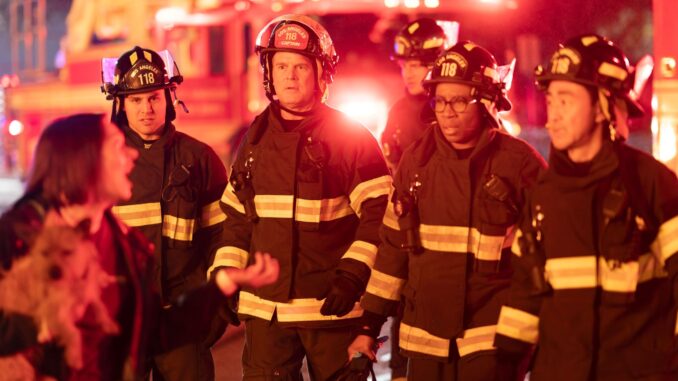
9-1-1 season 9’s biggest overarching story will be how it grapples with the enormity of the loss of Bobby Nash (Peter Krause), and a new image from the upcoming season confirms that it won’t make the same mistake that Chicago Fire made with one of its own fallen characters. Captain Bobby Nash was the glue that held Station 118 together, his calm and levelheaded demeanor hard-earned and shaped by the tragedy of his past.
As Bobby finally processed his trauma and forgave himself, it opened him up to find new love again in the form of Athena Grant (Angela Bassett). The pair started dating in season 1 and were married by the end of season 2, with Bobby becoming a true father to Athena’s kids, Harry and May. The most well-rounded character of the show, Bobby was a leader in every sense of the word in both his personal and professional life.
It’s why Bobby’s death in 9-1-1 season 8 was such a cataclysmic shock to all. Even if the hope that 9-1-1 season 9 will rename the station after Bobby Nash is unlikely to happen, the most recent reveal from the upcoming season confirmed that the show will properly honor the fallen captain of the 118, and that it will honor him early. In doing so, it avoids the problem that its fellow first-responder drama ran into 10 years ago.
When it comes to long-running TV dramas, consistency is everything. Fans stick around for gripping storylines, emotional connections, and characters they’ve grown to love. But sometimes, even the best shows make missteps. A perfect example? Chicago Fire’s infamous storytelling stumble that still lingers in fans’ memories a decade later. Now, 9-1-1 is heading into its ninth season, and it’s already proving that it won’t fall into the same trap.
In this article, we’ll break down exactly what went wrong for Chicago Fire, how 9-1-1 is learning from it, and why fans should feel confident about the future of their favorite high-stakes first responder drama.
What Was Chicago Fire’s 10-Year-Old Mistake?
Chicago Fire, which debuted back in 2012, quickly became NBC’s flagship procedural drama. But by the time it reached its later seasons, one glaring issue had fans frustrated: character fatigue and poor exits.
Instead of carefully balancing its main cast, the show leaned heavily on shocking exits and dramatic shifts. While some departures made sense, others felt rushed, unnecessary, or poorly executed. Viewers started noticing a lack of consistency, and the emotional connection to the characters weakened.
The lesson? Killing or writing off characters without long-term payoff can erode fan trust.
Why 9-1-1 Is Different From Chicago Fire
9-1-1, Fox’s hit drama, has always stood out for its emotional storytelling and balanced character arcs. Instead of relying on constant turnover, the series invests in growth and layered development.
As it heads into Season 9, the showrunners seem determined not to recycle the same mistakes that hurt Chicago Fire. Here’s how:
-
Character-driven plots remain at the forefront rather than shock value.
-
Ensemble storytelling ensures no single actor carries the entire weight.
-
Natural progression of relationships gives fans payoff instead of disappointment.
Season 9: Setting the Stage for Longevity
Every show eventually hits a critical point where it must decide: do we keep fans hooked or do we risk burnout? 9-1-1 is at that point, and Season 9 seems like its chance to prove it has staying power.
By avoiding sudden, careless exits and focusing on grounded, emotional storytelling, Season 9 is crafting a foundation for long-term success.
Character Development Over Cheap Thrills
Fans don’t just tune in for explosions and emergencies—they tune in because they care about Buck, Athena, Bobby, Maddie, and the rest of the crew. Unlike Chicago Fire’s mistake of cutting corners with character arcs, 9-1-1 has consistently taken the time to show growth.
Think about Buck’s journey from impulsive rookie to responsible leader. That arc wasn’t rushed. It felt real. That’s the formula Season 9 is sticking to.
Ensemble Balance That Works
Another area where 9-1-1 shines is balance. While Chicago Fire sometimes lost its footing by leaning too hard on certain characters, 9-1-1 spreads the spotlight.
Season 9 promises to continue weaving multiple storylines together—from on-the-job rescues to deeply personal struggles. This keeps the show fresh while avoiding burnout on any single arc.
Chicago Fire vs. 9-1-1: A Tale of Two Strategies
Let’s put it side by side:
-
Chicago Fire: Relied on shocking exits, uneven arcs, and short-lived relationships.
-
9-1-1: Focuses on natural storytelling, meaningful progression, and emotional investment.
The difference? One chases short-term drama, the other builds for long-term impact.
Why Fans Trust 9-1-1 More
Trust is huge in TV storytelling. Fans want to feel like their emotional investment won’t be wasted. After years of consistent delivery, 9-1-1 has earned that trust.
Season 9, by staying true to its character-first approach, is proving that it values fans’ loyalty and won’t risk repeating the decade-old blunders of Chicago Fire.
The Power of Emotional Payoff
Every fan remembers the heart-wrenching moments that stick with them—the rescues, the reunions, the sacrifices. But what makes 9-1-1 stand apart is its ability to tie those moments into character journeys.
Instead of shocking for ratings, it delivers emotional payoffs that feel earned. Season 9 is already shaping up to deliver more of these powerful, gut-punching moments.
Storytelling Lessons Learned From Chicago Fire
If there’s one silver lining to Chicago Fire’s past mistakes, it’s that newer shows have a playbook of what not to do. 9-1-1’s writers clearly understand that:
-
Don’t abandon long-term arcs.
-
Don’t sideline fan favorites without reason.
-
Don’t rely solely on dramatic exits to move the plot forward.
Season 9 appears to be embracing these lessons wholeheartedly.
Relationships That Actually Matter
Remember when Chicago Fire introduced relationships only to cut them short without closure? That left fans frustrated.
9-1-1, on the other hand, invests deeply in its character relationships. Whether it’s Bobby and Athena’s marriage, or Chimney and Maddie’s struggles, Season 9 is ensuring these bonds grow stronger, rather than disappearing without explanation.
The Importance of Legacy
Another big difference? Chicago Fire sometimes forgot its roots, while 9-1-1 actively honors them. Legacy matters, and Season 9 is already shaping up to continue respecting the show’s history while pushing forward.
This connection to the past is what keeps fans invested for the long haul.
Fan Reactions: Optimism for Season 9
Social media is already buzzing with excitement. Longtime viewers feel confident that 9-1-1 won’t repeat the same old mistakes. Why? Because the track record speaks for itself.
Fans are already praising the show for focusing on emotional storytelling and strong ensemble chemistry.

Where Chicago Fire Stumbled, 9-1-1 Will Soar
At the end of the day, TV shows survive when they learn from the past. Chicago Fire’s stumble remains a cautionary tale. But 9-1-1 Season 9 has shown that it knows how to avoid falling into the same trap.
By keeping its storytelling sharp, its characters layered, and its relationships meaningful, 9-1-1 is setting itself up for a stronger, longer future.
Conclusion
Chicago Fire’s decade-old mistake is a reminder of how easily a great show can falter. But 9-1-1 Season 9 is proving it has no intention of repeating history. With its commitment to authentic character arcs, balanced storytelling, and emotional payoffs, fans can look forward to a season that stays true to what makes the series so beloved. If Season 9 keeps this momentum, 9-1-1 might just set the standard for how long-running dramas should handle growth, change, and legacy.